|
|
|
Sort Order |
|
|
|
Items / Page
|
|
|
|
|
|
|
| Srl | Item |
| 1 |
ID:
098963
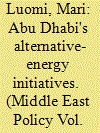

|
|
|
| 2 |
ID:
089127
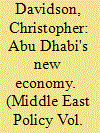

|
|
|
|
|
| Publication |
2009.
|
| Summary/Abstract |
At the helm of the United Arab Emirates federation, Abu Dhabi powered into the twenty-first century on the back of ever-increasing oil revenues, well-established petrochemical industries, and massive oil-financed overseas investments.
|
|
|
|
|
|
|
|
|
|
|
|
|
|
|
|
| 3 |
ID:
123888
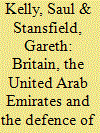

|
|
|
|
|
| Publication |
2013.
|
| Summary/Abstract |
This article investigates the deepening of the UK's security and defence arrangements with the United Arab Emirates (UAE).
In recent years there has been a flurry of diplomatic activity indicating far closer engagement between London and Abu Dhabi. Rather than being an innovative initiative of the Cameron government, the interaction has deeper roots, with this article uncovering the importance of the relatively unknown Defence Cooperation Agreement (DCA) of 1996, signed by the Major government. Furthermore, the UK-UAE defence relationship is shown to have endured beyond the infamous UK withdrawal from 'east of Suez' in 1971.
The current engagement is, however, more intense and potentially far-reaching than it had been in recent decades, with the defence sector being placed at the forefront of UK efforts to bolster the relationship with the oil-rich Gulf emirate.
Using official statements from London and Abu Dhabi, this article suggests that the UK-UAE relationship has always remained intact, although it lost focus following the end of the Major government until the refocusing on the Gulf by the Cameron government. The article concludes with an assessment of the expectations of the UAE, and the strategic drivers underpinning UK policy.
|
|
|
|
|
|
|
|
|
|
|
|
|
|
|
|
| 4 |
ID:
076482
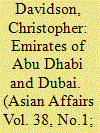

|
|
|
| 5 |
ID:
087133
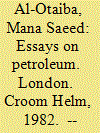

|
|
|
|
|
| Publication |
London, Croom Helm, 1982.
|
| Description |
175p.
|
|
|
|
|
|
|
|
|
|
|
|
Copies: C:1/I:0,R:0,Q:0
Circulation
| Accession# | Call# | Current Location | Status | Policy | Location |
| 021604 | 333.823/ALO 021604 | Main | On Shelf | General | |
|
|
|
|
| 6 |
ID:
177279
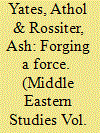

|
|
|
|
|
| Summary/Abstract |
It has long been observed that the development of professional security institutions is a key stage in modern state formation. Leaders of many proto-states embarking on programs of rapid development – such as many of the rulers of the Arab Gulf States in the 1960s – have brought in foreign professional expertise to assist in building up fledgling state institutions, including militaries, police forces and intelligence services. We know little, however, about the relationship between ruler and these key expatriates performing these functions. To help fill this lacuna, this article examines the first three expatriate professional heads of Abu Dhabi Police over the period 1959-68 and their relationship with their paymasters – first Shaikh Shakhbut bin Sultan Al Nahyan, then his brother, Shaikh Zayed. It details the difficulties these professional expatriates faced in operating within this ruler-dominated political-administration system. We believe observations made in this study have relevance to the contemporary Gulf, where governments continue to employ highly skilled expatriates in their security institutions and much else besides.
|
|
|
|
|
|
|
|
|
|
|
|
|
|
|
|
| 7 |
ID:
177204
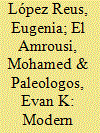

|
|
|
|
|
| Summary/Abstract |
Our work analyzes some key public, late modernist and contemporary buildings in Abu Dhabi in order to examine how the capital of this Arab country has dealt with issues of local tradition versus modernization, at a time of rapid economic and social change. Modernist and contemporary interpretations of Arab architectural tradition are deliberated as well as, design strategies to create spaces of social inclusion and provide sustainable solutions appropriate for the harsh regional climatic conditions. Our article also argues that recognition and integration of buildings from the late modernist era, such as the Abu Dhabi Cultural Foundation, are essential elements for a city of sparse historical references, playing the role of “modern heritage”. Preservation of such buildings and resilient architecture can guide contemporary architectural discourse and reconcile local tradition and modern design strategies, thus counteracting uncritical importation of iconic projects in the modern Gulf cities.
|
|
|
|
|
|
|
|
|
|
|
|
|
|
|
|
| 8 |
ID:
115844
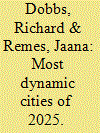

|
|
|
| 9 |
ID:
177210
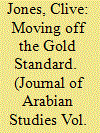

|
|
|
|
|
| Summary/Abstract |
This article analyses the rationale behind the pursuit of nuclear energy by the United Arab Emirates (UAE) and Saudi Arabia, a rationale that is best understood by a particular construct of “stateness”. While the drive towards nuclear energy is justified by a growing demographic, it is also about the projection of prestige which cuts to the very core of regime legitimacy. This in turn feeds into the growing ideational competition between and among the Gulf states and Iran, with nuclear energy increasingly being “securitised” in pursuit of this “stateless”. However, the development of a nuclear programme by Saudi Arabia in particular has come to test the normative frameworks that have hitherto regulated the transfer of nuclear technologies. With regionalism in retreat, and concern over the longer-term commitment of the United States to underpin Gulf security, the development of nuclear energy in the Gulf is leading to a truly “atomised” security complex, the dynamic of which can likely only be controlled on a bespoke basis.
|
|
|
|
|
|
|
|
|
|
|
|
|
|
|
|
| 10 |
ID:
045052
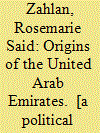

|
|
|
|
|
| Publication |
London, Macmillan Press Ltd., 1978.
|
| Description |
xix, 278p.: ill.hbk
|
| Standard Number |
0333241096
|
|
|
|
|
|
|
|
|
|
|
|
Copies: C:1/I:0,R:0,Q:0
Circulation
| Accession# | Call# | Current Location | Status | Policy | Location |
| 021543 | 953.5705/ZAH 021543 | Main | On Shelf | General | |
|
|
|
|
| 11 |
ID:
115005
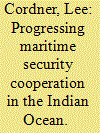

|
|
|
|
|
| Publication |
2011.
|
| Summary/Abstract |
The theme of the second Indian Ocean Naval Symposium (IONS), hosted in
Abu Dhabi by the United Arab Emirates (UAE) Navy on 10-12 May 2010,
was "Together for the Reinforcement of Maritime Security in the Indian
Ocean."
1
Navy chiefs of service and senior maritime security officers or their
representatives from thirty of the thirty-two Indian Ocean region (IOR) navies
and maritime security forces gathered for this significant event. Participants
from the diverse Indian Ocean littoral came from the Arabian Gulf and the Red
Sea, Africa, South Asia, Southeast Asia, and Australia.
2
Pakistan, which had declined an invitation to attend the first IONS meeting, in New Delhi in 2008, was
represented by the local air attaché. In addition, extraregional maritime force
participants included the U.S. Navy, represented by Commander, Naval Forces,
U.S. Central Command, Vice Admiral William
Gortney, and the Deputy Chief of Naval Operations,
Vice Admiral Bruce W. Clingan; the Italian Navy, represented by its chief, Admiral Bruno Branciforte; and
the Royal Navy of the United Kingdom, which sent a
senior delegation. Notable was the absence of participants from the navies of other external countries with
significant and growing interests in the IOR, for example, China, Russia, Japan, and the Republic of
Korea.
|
|
|
|
|
|
|
|
|
|
|
|
|
|
|
|
| 12 |
ID:
190345
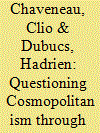

|
|
|
|
|
| Summary/Abstract |
Owing to their diverse populations and particular social configurations, the United Arab Emirates offer a unique urban context in which to question the notion of cosmopolitanism and its daily manifestations, since the main cities of the Emirates maximize occasions for intercultural interaction while maintaining major economic divisions and social hierarchies in most parts of daily life. While national and ethnic categories in the Emirates are often presented in the literature as being rigid, this paper argues that a biographical approach allows for a finer analysis of cosmopolitan situations. The French residents of Abu Dhabi and Dubai, relatively privileged migrants, position themselves along a wide spectrum of places and activities, raising different social and urban issues. Based on 26 months of participant observation in Abu Dhabi and Dubai and 12 in-depth interviews with French residents of the UAE, this paper shows that their forms of sociability, social practices, and international mobility work together to shape diverse and sometimes paradoxical forms of openness to national, ethnic, or social “others”.
|
|
|
|
|
|
|
|
|
|
|
|
|
|
|
|
| 13 |
ID:
111425
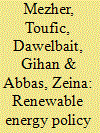

|
|
|
|
|
| Publication |
2012.
|
| Summary/Abstract |
Climate change and fossil fuel depletion are the main drivers for the recent focus on Renewable Energy (RE) resources. However, since the high cost of RE technologies is the main obstacle facing the diffusion of RE power generation, economic and political intervention is inevitable. In the United Arab Emirates (UAE) population and economic growth are the main causes of a sharp increase of energy demand. Two key related factors highlight the need to establish a RE sector: first the UAE has one of the highest carbon footprint in the world and second, the rate of depletion of its main energy generation resource - fossil fuel. In this study, we present a review of overall policies in sixty-one countries, focusing on their efforts to adopt RE resources in the power sector, and on their implementation of fundamental policies implemented. Furthermore, we investigate the applicability to Abu Dhabi UAE of the main RE policies implemented worldwide. As a result of our analysis, we recommend the implementation of a mixed policy of Feed-in-Tariff (FIT) and the Quota system for RE electricity generation in order for the UAE to meet its 7% target by 2020.
|
|
|
|
|
|
|
|
|
|
|
|
|
|
|
|
| 14 |
ID:
191868
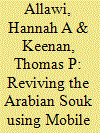

|
|
|
|
|
| Summary/Abstract |
This article discusses the outcomes of a Focus Group thematic analysis that revolved around the topic of using mobile Augmented Reality (AR) technology to help revive the Arabian Souk. The Old Souk of the city of Abu Dhabi was utilized as a case study for revival, using AR for a new form of smart tourism for the city. Major themes revealed both intangible and tangible elements through a variety of shops, products and personal experiences from those who have visited the Old Souk. The themes were then turned into an AR experience, in the form of three-dimensional (3D) computer-aided models, to aid in experiencing the once existing Old Souk on its original site today. This article points to the potential of recreating the Arabian Souk using AR technology as part of the Arabian Gulf’s smart tourism experience.
|
|
|
|
|
|
|
|
|
|
|
|
|
|
|
|
| 15 |
ID:
190347
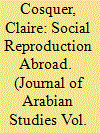

|
|
|
|
|
| Summary/Abstract |
This article looks at how the highly internationalized context of Abu Dhabi and the benefits of migration intersect for French migrants. It analyzes the tensions surrounding a specific form of the repatriation of the benefits of migration: how these are passed on to children. While French migrants generally receive higher salaries and consolidate dominant class positions in Abu Dhabi, they also have to deal with the remoteness of national structures of social reproduction. Drawing on an ethnographic study of French migrants in Abu Dhabi conducted from October 2015 to May 2016 (participant observation and interviews, n = 70), this article argues that migrants adjust their educational strategies in order to build up a cosmopolitan repertoire and ensure different paths of social reproduction. The article introduces three forms of educational strategies and associated cosmopolitan repertoires and shows how these relate to the parents’ social positions.
|
|
|
|
|
|
|
|
|
|
|
|
|
|
|
|
| 16 |
ID:
089544
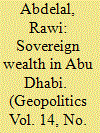

|
|
|
|
|
| Publication |
2009.
|
| Summary/Abstract |
By the turn of the century, oil had already made the tiny emirate of Abu Dhabi rich beyond anyone's wildest dreams. A sovereign wealth fund, the Abu Dhabi Investment Authority (ADIA), has invested extra oil revenues abroad for more than thirty years and amassed a still-growing portfolio worth approximately $750-900 billion. ADIA is widely believed to be the world's largest sovereign wealth fund - indeed the world's largest institutional investor. But Abu Dhabi is not yet a "developed" economy. So, in 2002, the Mubadala Development Company was established as a government-owned investment vehicle. Unlike ADIA's mandate to build and manage a financial portfolio, Mubadala's charge was to develop Abu Dhabi. According to some observers, ADIA was a "sovereign savings fund," while Mubadala was a government-owned investment firm. Mubadala is supposed to invest the wealth of the emirate in activities that would diversify the economy away from energy and into industry and services. Although each Mubadala investment is supposed to earn large returns, the strategy balances financial against "strategic" returns. ADIA and Mubadala are the institutional architecture to manage the wealth of the Abu Dhabi sovereign.
|
|
|
|
|
|
|
|
|
|
|
|
|
|
|
|
| 17 |
ID:
111104
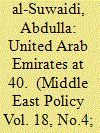

|
|
|
|
|
|
|
|